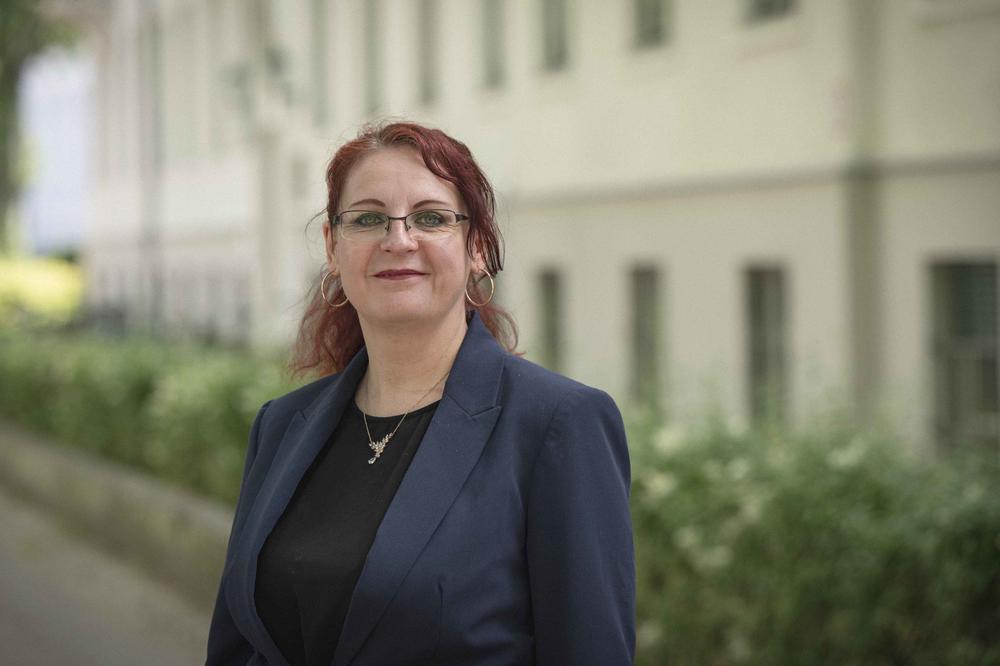Autocratic Rule despite Elections
Political scientist Anja Osei examines democratization processes in African countries
Aug 07, 2023
Prof. Dr. Anja Osei, Center for Politics and Society in Africa, Otto Suhr Institute of Political Science, Freie Universität Berlin.
Image Credit: Bernd Wannenmacher
Despite enjoying a high level of approval in many countries in Africa, democracy is not widely in place as a form of government. Anja Osei, a professor of politics and society in Africa who is based at the Otto Suhr Institute at Freie Universität Berlin, explains why this is the case. Osei, who has been teaching and conducting research at Freie Universität since October 2022, is specialized in democratization processes. She is currently investigating the role of parliaments in so-called electoral autocracies. She says that today in many African countries the form of government is authoritarian rule, despite elections.
Digital Transparency
Anyone who wants to know who is in the German Bundestag, the French National Assembly, or the United States Congress can easily find out with a few clicks. The parliaments in these countries usually have extensive websites listing not only the names, but also the CVs and voting behavior of the members of parliament. According to Osei, that is not the case in Gabon or Cameroon. She says that in those countries it is often difficult to learn the names of the members of parliament, much less find any information about their background or what policies they pursue.
Formally Democratic
Anja Osei has been a professor of politics and society in Africa at the Otto Suhr Institute of Political Science at Freie Universität since October 2022. In her current research project “Do Legislatures Enhance Democracy in Africa?” (DLEDA), Osei is examining the role of parliaments in so-called electoral autocracies on the African continent. These are countries that are formally democratic, but which have been ruled for decades by influential individuals or political parties: Benin, Botswana, Cameroon, Gabon, Tanzania, Togo, and Uganda.
Osei and her team are conducting face-to-face interviews in the national assemblies of these countries. The response rates are above 80 per cent. In a first step they are trying to find out how representative the parliaments are, for example, with regard to gender, religion, and ethnicity. She is being supported by two doctoral researchers as well as a network of NGOs and various opinion research institutes.
Strong Academic Background
Osei is specialized in issues related to democratization processes on the African continent. After earning her doctorate at the University of Leipzig, she worked for several years at the University of Konstanz. “I was originally trained in African studies, a qualitatively oriented regional studies field,” she says. “I was trained that it is necessary to go out and listen.”
Her academic career then led her to political science, which is more quantitatively oriented. “Today,” says Osei, “I am part of a younger generation of female researchers with backgrounds in regional studies paired with methodological competence.”
Following her appointment to Freie Universität Berlin, a discussion erupted on social media as to whether it would not have been preferable to hire a Black person in this position. Osei agrees that we should all do more to promote equal opportunities and provide more support for researchers from Africa. However, she thinks it would be sending the wrong signal to select someone based on certain attributes such as skin color or gender. “I do not think that skin color automatically goes hand in hand with certain qualifications or political positions,” she says. “People in Africa are far too diverse for that, just like people anywhere else in the world.”
Stagnation in Development of Democracy
Osei describes Africa as a patchwork quilt in terms of democracy. She points out that some countries, such as Ghana, have relatively stable democracies. Others, such as Cameroon, have a multiparty system, but are still governed autocratically. Gambia has democratized recently, while other states, such as Benin, are in danger of falling back into autocracies after going through democratic interludes. Osei notes that there was a wave of democratization in Africa in the 1990s, but she says that, unfortunately, this development is stagnating.
Initial research results from the DLEDA project indicate that many parliaments in the countries included in the study reflect the ethnic and religious composition of the electorate. In general, however, women and young people are underrepresented. Most of the representatives are well educated, often having studied abroad, and they have had successful careers in business or administration. One thing that is striking, however, is an extremely high turnover. Osei notes that in each legislative period roughly fifty to seventy percent of the representatives are new. In the African countries under investigation, only a few of the candidates are re-elected to office.
The main reason seems to be that many candidates make unrealistic promises during their election campaigns. According to Osei, it is common to run for election with promises to build a new street or a hospital in their home district, but such promises cannot be fulfilled by a single member of parliament. Of course, this lack of success in carrying out promises disappoints voters, who turn away in the next election.
Historical Burden
In addition, the continent’s colonial past continues to be a burden for democratic development in Africa today. Osei says, “The colonial states set up by Europeans were fundamentally organized in a repressive manner. Present-day democracies inherited these states with their history, administration, and infrastructure and still have to deal with the ramifications.”
As we are currently experiencing in Europe and the United States, creating and maintaining stable democracies is a difficult and never-ending process in any case. Osei points out that among the populations in most African countries, there is a high level of support for democracy. She emphasizes that this regard for democracy is a great asset that should not be underestimated.
The original German version of this article appeared in campus.leben, the online magazine published by Freie Universität Berlin.

